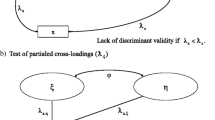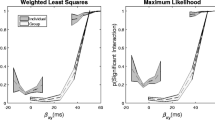Abstract
In this paper, we take forward Schwarz’s (2009) disjunction between measurement-apparatus-questionnaire and measurement-apparatus-man to examine how the crisis in contemporary psychology is related to assumptions about two sets of connections in research: connections between research tools, research behaviours, and psychological phenomena; and connections between researchers and researchees. By setting up a research problem with methodological and ethical implications, we describe three approaches that involve different assumptions and research activities in relation to the ways each makes these connections: Disassociated, Conventionally Connected and Persons in Dialogue Approaches. We argue that a Persons in Dialogue Approach is the most appropriate approach for a 21st Century psychology in crisis.
Similar content being viewed by others
References
Anderson, C. A., Shibuya, A., Ihori, N., Swing, E., Bushman, B. J., Sakamoto, A., et al. (2010). Violent video game effects on aggression, empathy, and prosocial behavior in Eastern and Western countries: a meta-analytic review. Psychological Bulletin, 136(2), 151–173.
Bergman, L. R., Magnusson, D., & El-Khouri, B. M. (2003). Studying individual development in an interindividual context: A person-oriented approach. Mahwah: Lawrence Erlbaum Associates.
Bibace, R., Clegg, J. W., & Valsiner, J. (2009). What is in a name? Understanding the implications of participant terminology. Integrative Psychology and Behavioral Science, 43, 67–77.
Coleman, C. H., & Bouësseau, M.-C. (2008). How do we know that research ethics committees are really working? The neglected role of outcomes assessment in research ethics reviews. BMC Medical Ethics, 9(6) doi:10.1186/1472-6939-9-6.
Danziger, K. (2000). Making social science experimental: a conceptual history, 1920–1970. Journal of the History of the Behavioural Sciences, 36(4), 329–347.
Kohler, A. (2010). To think human out of the machine paradigm: Homo ex machina. Integrative Psychology and Behavioral Science, 44, 39–57.
Lawrence, J. A. (1987). Verbal processing of the Defining Issues Test by principled and non-principled moral reasoners. Journal of Moral Education, 16(2), 117–130.
Molenaar, P. C. M. (2004). A manifesto on psychology as ideographic science: bringing the person back into scientific psychology, this time forever. Measurement, 2(4), 201–218.
National Health and Medical Research Council. (2007). National statement of ethical conduct in human research. Canberra: Australian Government, National Health and Medical Research Council.
Schwarz, M. (2009). Is psychology based on a methodological error? Integrative Psychology and Behavioral Science, 43, 185–213.
Skinner, B. F. (1974). About behaviorism. New York: Arnold A. Knopf, Inc.
Toomela, A. (2008). Variables in psychology: a critique of quantitative psychology. Integrative Psychology and Behavioral Science, 42, 245–265.
Valsiner, J. (2009). Integrating psychology within the globalizing world: A requiem to the postmodern experiment with Wissenschaft. Integrative Psychology and Behavioral Science, 43, 1–21.
Van Geert, P. (2006). Time, models and narratives: towards understanding the dynamics of life. Culture and Psychology, 12(4), 487–507.
von Eye, A., & Bogat, G. A. (2006). Person-oriented and variable-oriented research: concepts, results and development. Merrill-Palmer Quarterly, 52(3), 390–420.
Wagoner, B. (2009). The experimental methodology of constructive microgenesis. In J. Valsiner, P. C. M. Molenaar, M. C. D. P. Lyra, & N. Chaudhary (Eds.), Dynamic process methodology in the social and developmental sciences (pp. 99–122). New York: Springer.
Author information
Authors and Affiliations
Corresponding author
Rights and permissions
About this article
Cite this article
Lawrence, J.A., Dodds, A.E. Three Approaches to the Disjunction Between Psychological Measurement and Psychological Persons: Methodological and Ethical Considerations. Integr. psych. behav. 44, 299–309 (2010). https://doi.org/10.1007/s12124-010-9129-4
Published:
Issue Date:
DOI: https://doi.org/10.1007/s12124-010-9129-4




